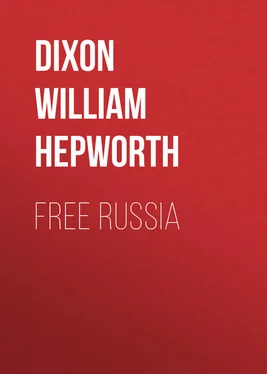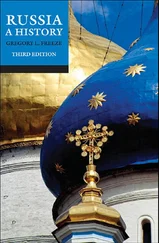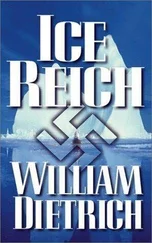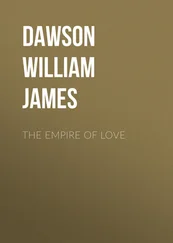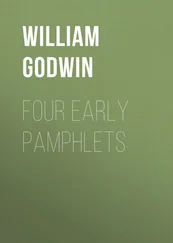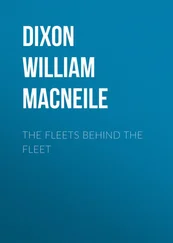William Dixon - Free Russia
Здесь есть возможность читать онлайн «William Dixon - Free Russia» — ознакомительный отрывок электронной книги совершенно бесплатно, а после прочтения отрывка купить полную версию. В некоторых случаях можно слушать аудио, скачать через торрент в формате fb2 и присутствует краткое содержание. Жанр: foreign_antique, foreign_prose, на английском языке. Описание произведения, (предисловие) а так же отзывы посетителей доступны на портале библиотеки ЛибКат.
- Название:Free Russia
- Автор:
- Жанр:
- Год:неизвестен
- ISBN:нет данных
- Рейтинг книги:3 / 5. Голосов: 1
-
Избранное:Добавить в избранное
- Отзывы:
-
Ваша оценка:
- 60
- 1
- 2
- 3
- 4
- 5
Free Russia: краткое содержание, описание и аннотация
Предлагаем к чтению аннотацию, описание, краткое содержание или предисловие (зависит от того, что написал сам автор книги «Free Russia»). Если вы не нашли необходимую информацию о книге — напишите в комментариях, мы постараемся отыскать её.
Free Russia — читать онлайн ознакомительный отрывок
Ниже представлен текст книги, разбитый по страницам. Система сохранения места последней прочитанной страницы, позволяет с удобством читать онлайн бесплатно книгу «Free Russia», без необходимости каждый раз заново искать на чём Вы остановились. Поставьте закладку, и сможете в любой момент перейти на страницу, на которой закончили чтение.
Интервал:
Закладка:
The new method is not so Asiatic as the old; but in time it will lead the humblest officer in Russia to feel that he is a man.
Archangel is not a port and city in the sense in which Hamburg and Hull are ports and cities; clusters of docks and sheds, with shops, and wagons, and a busy private trade. Archangel is a camp of shanties, heaped around groups of belfries, cupolas and domes. Imagine a vast green marsh along the bank of a broad brown river, with mounds of clay cropping here and there out of the peat and bog; put buildings on these mounds of clay; adorn the buildings with frescoes, crown them with cupolas and crosses; fill in the space between church and convent, convent and church, with piles and planks, so as to make ground for gardens, streets, and yards; cut two wide lanes, from the church called Smith's Wife to the monastery of St. Michael, three or four miles in length; connect these lanes and the stream by a dozen clearings; paint the walls of church and convent white, the domes green and blue; surround the log houses with open gardens; stick a geranium, a fuschia, an oleander into every window; leave the grass growing everywhere in street and clearing – and you have Archangel.
Half-way from Smith's Wife's quarter to the Monastery, stand, in picturesque groups, the sites determined by the mounds of clay, the public buildings; fire-tower, cathedral, town-hall, court of justice, governor's house, museum; new and rough, with a glow of bright new paint upon them all. The collection in the museum is poor; the gilt on the cathedral rich. When seen from a distance, the domes and turrets of Archangel give it the appearance of some sacred Eastern city rather than a place of trade.
This sea-port on the Dvina is the only port in Russia proper. Astrachan is a Tartar port; Odessa an Italian port; Riga a Livonian port; Helsingfors a Finnish port. None of these outlets to the sea are in Russia proper, nor is the language spoken in any of them Russ. Won by the sword, they may be lost by the sword. As foreign conquests, they must follow the fate of war; and in Russia proper their loss might not be deeply felt; Great Russia being vast enough for independence and rich enough for happiness, even if she had to live without that belt of lesser Russias in which for her pride and punishment she has lately been clasped and strained. Archangel, on the other side, is her one highway to the sea; the outlet of her northern waters; her old and free communication with the world; an outlet given to her by God, and not to be taken away from her by man.
Such as they are, the port and city of Archangel owe their birth to English adventure, their prosperity to English trade.
In the last year of King Edward the Sixth, an English ship, in pressing her prow against the sand-banks of the Frozen Sea, hoping to light on a passage to Cathay, met with a broad sheet of water, flowing steadily and swiftly from the south. That ship was the "Bonaventure;" her master was Richard Challoner; who had parted from his chief, Sir Hugh Willoughby, in a storm. The water coming down from the south was fresh. A low green isle lay on his port, which he laid down in his chart as Rose Island; afterwards to be famous as the cradle of our northern trade. Pushing up the stream in search of a town, he came upon a small cloister, from the monks of which he learned that he was not in Cathay, but in Great Russia.
Great was a name given by old Russians, not only to the capital of their country, but to the country itself. Their capital was Great Novgorod; their country was Great Russia.
Sir Hugh Willoughby was driven by storms into "the harbor of death," in which he and his crews all perished in the ice; while his luckier lieutenant pushed up the Dvina to Vologda, whence he forced his way to Moscow, and saw the Grand Duke, Ivan the Fourth. In that age Russia was known to Europe as Moscovia, from the city of Moscow; a city which had ravaged her old pre-eminence from Novgorod, and made herself mistress of Great Russia.
Challoner was wrecked and drowned on his second voyage; but those who followed him built an English factory for trade on Rose Island, near the cloister; while the Russians, on their side, built a fort and town on the Dvina, some thirty miles from its mouth; in which position they could watch the strangers in their country, and exchange with them their wax and skins for cotton shirts and pewter pans. The builder of this fort and town was Ivan Vassilivitch, known to us as Ivan the Terrible – Ivan the Fourth.
Ivan called his town the New Castle of St. Michael the Archangel; an unwieldy name, which his raftmen and sailors soon cut down – as raftmen and sailors will – into the final word. On English lips the name would have been St. Michael; but a Russian shrinks from using the name of that prince of heaven. To him Michael is not a saint, as Nicolas and George are saints; but a power, a virtue, and a sanctity, before whose lance the mightiest of rebel angels fell. No Russian speaks of this celestial warrior as a saint. He is the archangel; greatest of the host; selected champion of the living God. Convents and churches are inscribed to him by his celestial rank; but never by his personal name. The great cathedral of Moscow is only known as the Archangel's church. Michael is understood; for who but Michael could be meant? Ivan Vassilivitch had such a liking for this fighting power, that on his death-bed he gave orders for his body to be laid, not in that splendid pile of St. Vassili, which he had spent so much time and money in building near the Holy Gate, but in a chapel of the Archangel's church; and there the grim old tyrant lies, in a plain stone coffin, covered with a velvet pall.
Peter the Great rebuilt Archangel on a larger scale with more enduring brick. Peter was fond of the Frozen Sea, and twice, at least, he sailed over it to pray in the Convent of Solovetsk; a place which he valued, not only as a holy shrine, but as a frontier fortress, held by his brave old Russ against the Lapps and Swedes. Archangel was made by Peter his peculiar care; and masons were fetched from Holland to erect his lines of bastions, magazines, and quays. A castle rose from the ground on the river bank; an island was reclaimed from the river and trimmed with trees; a summer palace was designed and built for the Tsar. A fleet of ships was sent to command the Dvina mouth. In fact, Archangel was one of the three sites – St. Petersburg and Taganrog being the other two – on which the Emperor designed to build cities that, unlike Novgorod and Moscow, should be at once fortresses and ports.
The city of Ivan and the city of Peter have each in turn gone by. Not a stone of Ivan's town remains; for his new castle and monastery, being built of logs, were duly rotted by rain and consumed by fire. A fort and a monastery still protect and adorn the place; but these have both been raised in more recent years. Of Peter's city, though it seemed to be solid as the earth itself, hardly a house is standing to show the style. A heap of arches, riven by frost and blackened by smoke, is seen on the Dvina bank; a pretty kiosk peeps out from between the birches on Moses Isle; and these are all!
In our western eyes Archangel may seem to be over-rich in domes, as the delta may appear to be over-rich in crosses; but then, in our western eyes, the city is a magazine of oats and tar, of planks and skins; while in native eyes it is the archangel's house, the port of Solovetsk, and the gate of God.
CHAPTER V.
RELIGIOUS LIFE
A friend is one day driving me from house to house in Archangel, making calls, when we observe from time to time a smart officer going into courtyards.
"This man appears to be dogging our steps."
"Ha!" laughs my friend; "that fellow is an officer of police."
"Why is he following us?"
Читать дальшеИнтервал:
Закладка:
Похожие книги на «Free Russia»
Представляем Вашему вниманию похожие книги на «Free Russia» списком для выбора. Мы отобрали схожую по названию и смыслу литературу в надежде предоставить читателям больше вариантов отыскать новые, интересные, ещё непрочитанные произведения.
Обсуждение, отзывы о книге «Free Russia» и просто собственные мнения читателей. Оставьте ваши комментарии, напишите, что Вы думаете о произведении, его смысле или главных героях. Укажите что конкретно понравилось, а что нет, и почему Вы так считаете.
